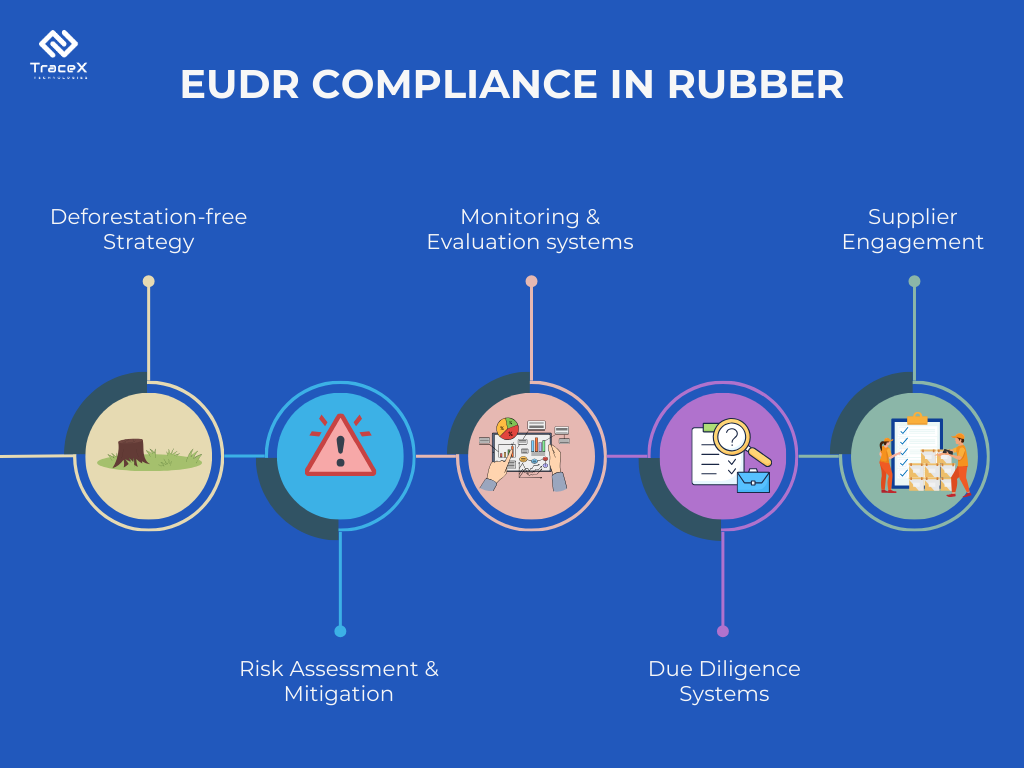Contact: +91 99725 24322 |
Menu
Menu
Quick summary: The EU's new deforestation law (EUDR) shakes things up for Indian rubber producers. This blog dives into the impact of EUDR, exploring both the challenges and opportunities it presents. Learn how Indian producers can adapt and thrive in this new era of sustainable sourcing.

The European Union (EU) is taking a stand against deforestation through its groundbreaking legislation, the EU Deforestation Regulation (EUDR). This regulation has significant implications for global trade, and India, a major player in the natural rubber market, is no exception. As a leading producer and exporter of rubber, Indian companies will need to navigate the new EUDR landscape to ensure continued access to the lucrative EU market.
India plays a crucial role in the global natural rubber market, ranking as the world’s fifth-largest producer and a significant exporter, particularly to the EU. This makes the EUDR a critical consideration for Indian rubber producers.
India is one of the developing world’s major victims, facing immense pressure due to land use and land cover (LULC) changes, particularly with the shift to exotic crops like rubber. Changes in land use can significantly impact the environmental stability of a region, with primary concerns revolving around negative environmental, economic, and social. A critical environmental issue stemming from the expansion of rubber plantations is the alteration of local and regional water regimes. As the fourth largest producer of natural rubber, after Thailand, Indonesia, and China, India relies heavily on the state of Kerala, which contributes 92% of the country’s total rubber production and covers 84% of the area under rubber cultivation.
Rubber cultivation in Kerala initially began in areas with degraded forests and gradually spread, replacing natural vegetation and other crops such as tapioca, cashew nuts, fruit trees, and coconut. Today, rubber plantations occupy about 14% of Kerala’s total geographical area, accounting for 21% of the state’s total cropped area.
Currently, there are approximately 8.5 lakh hectares of land dedicated to rubber cultivation in India.

The EU Deforestation Regulation (EUDR) throws down a gauntlet for companies placing products on the EU market, including Indian natural rubber producers. To ensure smooth sailing, understanding the key compliance requirements is crucial.
While these requirements may seem like hurdles, they also present significant opportunities for Indian rubber producers to adapt, innovate, and become leaders in the sustainable rubber market.
The EU Deforestation Regulation (EUDR) presents a complex landscape for Indian natural rubber producers. While the potential for a sustainable future exists, there are significant challenges that need to be addressed.
EUDR demands robust traceability systems to track rubber from plantation to port. This can involve significant investments in technologies like blockchain or satellite monitoring. For small and medium-sized Indian producers, the upfront cost of implementing such systems can be a major obstacle.
A significant portion of India’s natural rubber comes from smallholder farmers who may lack formal documentation for their land or harvesting practices. Obtaining this documentation can be challenging and time-consuming, hindering traceability efforts and potentially excluding smallholders from participating in the EU market.
There may be limited awareness among Indian rubber producers, particularly smallholders, about the specific requirements and complexities of EUDR. This lack of knowledge can hinder compliance efforts and leave producers vulnerable to non-compliance penalties.
Failure to comply with EUDR can lead to restrictions on placing rubber products on the EU market. Losing access to the lucrative EU market can have a devastating impact on Indian rubber producers, potentially leading to lost revenue and decreased profitability. This could also have a ripple effect on smallholder farmers who rely on the rubber industry for their livelihoods.
The EU Deforestation Regulation (EUDR) presents both challenges and opportunities for Indian natural rubber producers. By adopting strategic approaches, Indian producers can not only navigate EUDR compliance but also emerge as leaders in the sustainable rubber market.
Satellite monitoring and blockchain technology offer scalable options for tracking rubber throughout the supply chain. Government initiatives offering subsidies or grants for technology adoption can be particularly helpful for small and medium-sized producers.
Collaboration with industry bodies like NGOs and technology providers can be a valuable asset. These organizations can provide expertise, resources, and technology solutions to help producers build robust traceability systems and implement effective due diligence practices.
Smallholder farmers are the backbone of the Indian rubber industry. Initiatives that provide support with land documentation, record-keeping, and adoption of sustainable farming practices can significantly improve their participation in EUDR-compliant sourcing.
Participation in certification schemes recognized by the EUDR can demonstrate a producer’s commitment to deforestation-free sourcing and streamline compliance processes. Exploring existing certification programs and advocating for the development of India-specific EUDR-compliant schemes can be beneficial.
Utilizing data collected through traceability systems for reporting and communication with stakeholders can demonstrate transparency and commitment to responsible sourcing.
The TraceX EUDR platform goes beyond just a compliance tool. It equips Indian rubber producers with the resources and capabilities to thrive in the new regulatory landscape. By simplifying traceability, fostering collaboration, and promoting transparency, TraceX empowers Indian producers to become leaders in the sustainable rubber market.
1. Geolocation Data for Transparency:
2. Due Diligence Made Easy:
3. Building a Strong Evidence Trail:
By leveraging TraceX EUDR’s data collection, risk assessment, verification, and collaboration tools, you can demonstrate strong evidence of deforestation-free production throughout your rubber supply chain. This not only ensures EUDR compliance but also strengthens your reputation as a responsible and sustainable business.
The EU Deforestation Regulation (EUDR) presents both challenges and opportunities for Indian rubber producers. While navigating the complexities of traceability, due diligence, and data collection can be daunting, it also presents a chance to become a leader in the sustainable rubber market. By embracing innovative solutions like the TraceX EUDR platform, investing in collaboration, and empowering smallholder farmers, Indian producers can transform the EUDR challenge into a springboard for a thriving and sustainable future. This shift towards responsible sourcing practices not only ensures continued access to the lucrative EU market but also fosters a more environmentally conscious rubber industry, benefiting both producers and the planet.
